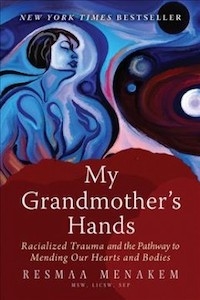
In My Grandmother’s Hands: Racialized Trauma and the Pathway to Mending Our Hearts and Bodies (2017), New York Times best-selling author and trauma specialist Resmaa Menakem explores, according to the publisher, “the damage caused by racism in America from the perspective of trauma and body-centered psychology.”
This description may sound sweeping, the subject matter may strike some as inflammatory, but this book, called “ground-breaking” by diverse reviewers, was anything but, at least for me. Menakem’s premise—that the division and suffering we have experienced and are experiencing in the United States will continue until we learn to heal the generational trauma inflicted by White Supremacy on black, white, and blue bodies—is grounded both in the wisdom of his grandmother, who picked cotton as a child, and his expertise in the field of somatic therapy. In a writing style that is both accessible and specific, utilizing extensive research, personal stories, and interviews, Menakem compassionately reveals the ways in which racism lives in all our bodies and compounds over time, across generations and between individuals. Among his many insights, his perspective on the brutality of the European Middle Ages, and how that brutality crossed the pond to inflict enduring pain in the U.S., blew me away.
And yes, it is, in fact, “blue bodies” that are featured in this book. Menakem, whose brother is a police officer in Minneapolis, Minnesota, sensitively explores the trauma that police officers suffer due to the systems and pressures under which they are forced to work.
My Grandmother’s Hands is a book that changed my perspective on the realities of race and racism in the United States. It also gave me hope.